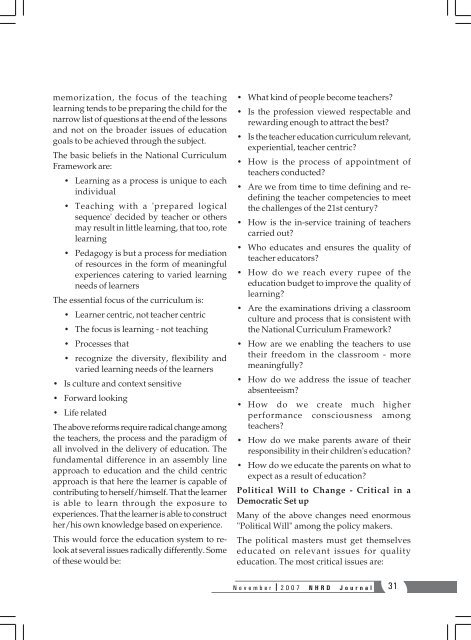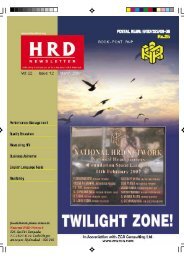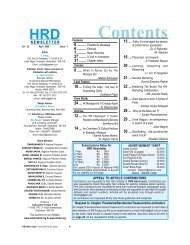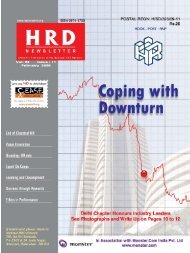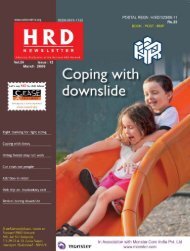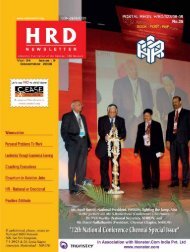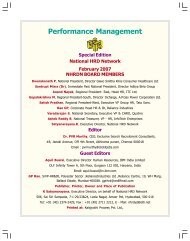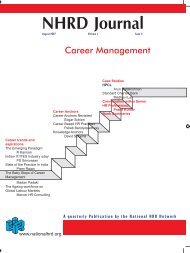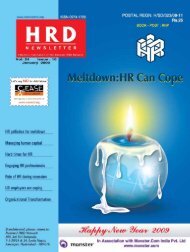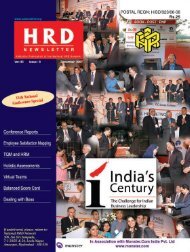NHRD Journal - National HRD Network
NHRD Journal - National HRD Network
NHRD Journal - National HRD Network
You also want an ePaper? Increase the reach of your titles
YUMPU automatically turns print PDFs into web optimized ePapers that Google loves.
memorization, the focus of the teaching<br />
learning tends to be preparing the child for the<br />
narrow list of questions at the end of the lessons<br />
and not on the broader issues of education<br />
goals to be achieved through the subject.<br />
The basic beliefs in the <strong>National</strong> Curriculum<br />
Framework are:<br />
• Learning as a process is unique to each<br />
individual<br />
• Teaching with a 'prepared logical<br />
sequence' decided by teacher or others<br />
may result in little learning, that too, rote<br />
learning<br />
• Pedagogy is but a process for mediation<br />
of resources in the form of meaningful<br />
experiences catering to varied learning<br />
needs of learners<br />
The essential focus of the curriculum is:<br />
• Learner centric, not teacher centric<br />
• The focus is learning - not teaching<br />
• Processes that<br />
• recognize the diversity, flexibility and<br />
varied learning needs of the learners<br />
• Is culture and context sensitive<br />
• Forward looking<br />
• Life related<br />
The above reforms require radical change among<br />
the teachers, the process and the paradigm of<br />
all involved in the delivery of education. The<br />
fundamental difference in an assembly line<br />
approach to education and the child centric<br />
approach is that here the learner is capable of<br />
contributing to herself/himself. That the learner<br />
is able to learn through the exposure to<br />
experiences. That the learner is able to construct<br />
her/his own knowledge based on experience.<br />
This would force the education system to relook<br />
at several issues radically differently. Some<br />
of these would be:<br />
• What kind of people become teachers?<br />
• Is the profession viewed respectable and<br />
rewarding enough to attract the best?<br />
• Is the teacher education curriculum relevant,<br />
experiential, teacher centric?<br />
• How is the process of appointment of<br />
teachers conducted?<br />
• Are we from time to time defining and redefining<br />
the teacher competencies to meet<br />
the challenges of the 21st century?<br />
• How is the in-service training of teachers<br />
carried out?<br />
• Who educates and ensures the quality of<br />
teacher educators?<br />
• How do we reach every rupee of the<br />
education budget to improve the quality of<br />
learning?<br />
• Are the examinations driving a classroom<br />
culture and process that is consistent with<br />
the <strong>National</strong> Curriculum Framework?<br />
• How are we enabling the teachers to use<br />
their freedom in the classroom - more<br />
meaningfully?<br />
• How do we address the issue of teacher<br />
absenteeism?<br />
• How do we create much higher<br />
performance consciousness among<br />
teachers?<br />
• How do we make parents aware of their<br />
responsibility in their children's education?<br />
• How do we educate the parents on what to<br />
expect as a result of education?<br />
Political Will to Change - Critical in a<br />
Democratic Set up<br />
Many of the above changes need enormous<br />
"Political Will" among the policy makers.<br />
The political masters must get themselves<br />
educated on relevant issues for quality<br />
education. The most critical issues are:<br />
November 2007 <strong>N<strong>HRD</strong></strong> <strong>Journal</strong> 31


